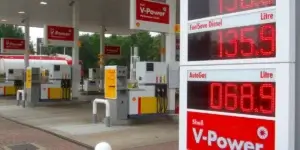What Does MPG Mean?
MPG stands for Miles Per Gallon and is a unit of measure for a car’s fuel economy. Simply put, it tells you how many miles a car can travel on one gallon of fuel. For instance, if a car is rated at 45.6mpg, it can go 45.6 miles on a single gallon of fuel. At MOTORS, we use the ‘official’ average MPG figures published by a car’s manufacturer, ensuring accurate and reliable data.

How is MPG Measured?
The procedures for measuring a car’s fuel economy have evolved over the years. The current standard is the Worldwide Harmonised Light-Duty Vehicle Testing Procedure (WLTP). This test is conducted in a lab, but is designed to reflect real-world driving conditions. Cars are driven on a rolling road through a series of acceleration runs, braking events, and cruising at different speeds. The amount of fuel used is measured, and a simple calculation reveals the car’s MPG.
What’s the difference between NEDC and WLTP?
Before WLTP, the New European Driving Cycle (NEDC) was used across Europe. While it created a level playing field for all cars, most owners found their vehicles didn’t match the ‘official’ MPG. The WLTP provides lower and more realistic numbers, making it a better measure of real-world fuel economy. If your car was launched after 2017, it was tested under WLTP.

Why are there several different MPG figures for every car?
Manufacturers often release different MPG figures for various driving conditions:
- Urban MPG measures fuel economy for city driving.
- Extra-urban MPG includes a mix of town driving and higher-speed A-roads.
- Combined MPG is an average of urban and extra-urban driving.
For most drivers, combined MPG is the most relevant figure, as it closely matches everyday driving conditions.
How accurate are official MPG figures?
While official MPG numbers offer a good guide, your real-world fuel economy can vary based on your driving habits. For example, plug-in hybrid cars often have optimistic MPG numbers. The real-world fuel economy for these cars depends on keeping the battery fully charged and how you drive.
How do I calculate my car’s MPG?
Want to know exactly what MPG your car delivers? Here’s how you can calculate it:
- Fill your car’s fuel tank until the pump clicks off. Note the mileage on the odometer or reset the trip computer.
- Next time you fill up, note the amount of fuel used (in litres) and the mileage.
- Divide the fuel amount by 4.546 to convert litres to gallons.
- Divide the mileage by the gallons used.
For example:
52.8 litres ÷ 4.546 = 11.615 gallons
368 miles ÷ 11.615 gallons = 31.683mpg
What does L/100KM mean?
L/100KM stands for Litres per 100 Kilometres, another unit of measure for fuel economy used in Europe and other metric system countries. To convert L/100KM to MPG, divide 282.5 by the L/100KM figure.

Can I improve my car’s MPG?
Improving your car’s MPG can save you money and reduce your carbon footprint. Here are some tips:
- Aerodynamics: Keep windows closed and remove roof racks when not in use to improve airflow.
- Tyre Pressure: Maintain correct tyre pressure to reduce friction and improve fuel efficiency.
- Reduce Weight: Remove unnecessary items from your car to lighten the load.
- Electrical Equipment: Use air conditioning and other electrical equipment sparingly.
- Regular Servicing: A well-maintained engine performs better and is more fuel-efficient.

Does how I drive affect my car’s MPG?
Absolutely! Your driving style can significantly impact fuel economy:
- Smooth Acceleration and Braking: Avoid rapid acceleration and hard braking.
- Optimal Gear Use: Shift gears appropriately in manual cars to keep the engine running efficiently.
- Eco Mode: Use your car’s eco mode if available to optimise fuel efficiency.
What cars give the best MPG?
Generally, smaller cars offer better fuel economy. However, larger diesel and hybrid vehicles can also be efficient, often achieving 60MPG or more. If you’re looking for cars with excellent fuel economy, check out our most economical petrol cars guide.

Final Thoughts
Understanding MPG is an important factor to consider when making informed decisions about your car’s fuel efficiency and running costs. By being aware of how MPG is measured, the factors that affect it, and ways to improve it, you can optimise your driving experience and save money. For more tips on buying and selling cars, visit Motors’ advice hub.
By following these guidelines, you’ll be well equipped to make the most of your vehicle’s fuel economy, ensuring a smoother, more cost effective driving experience. For further resources, explore our comprehensive guides on car maintenance and buying used cars.


